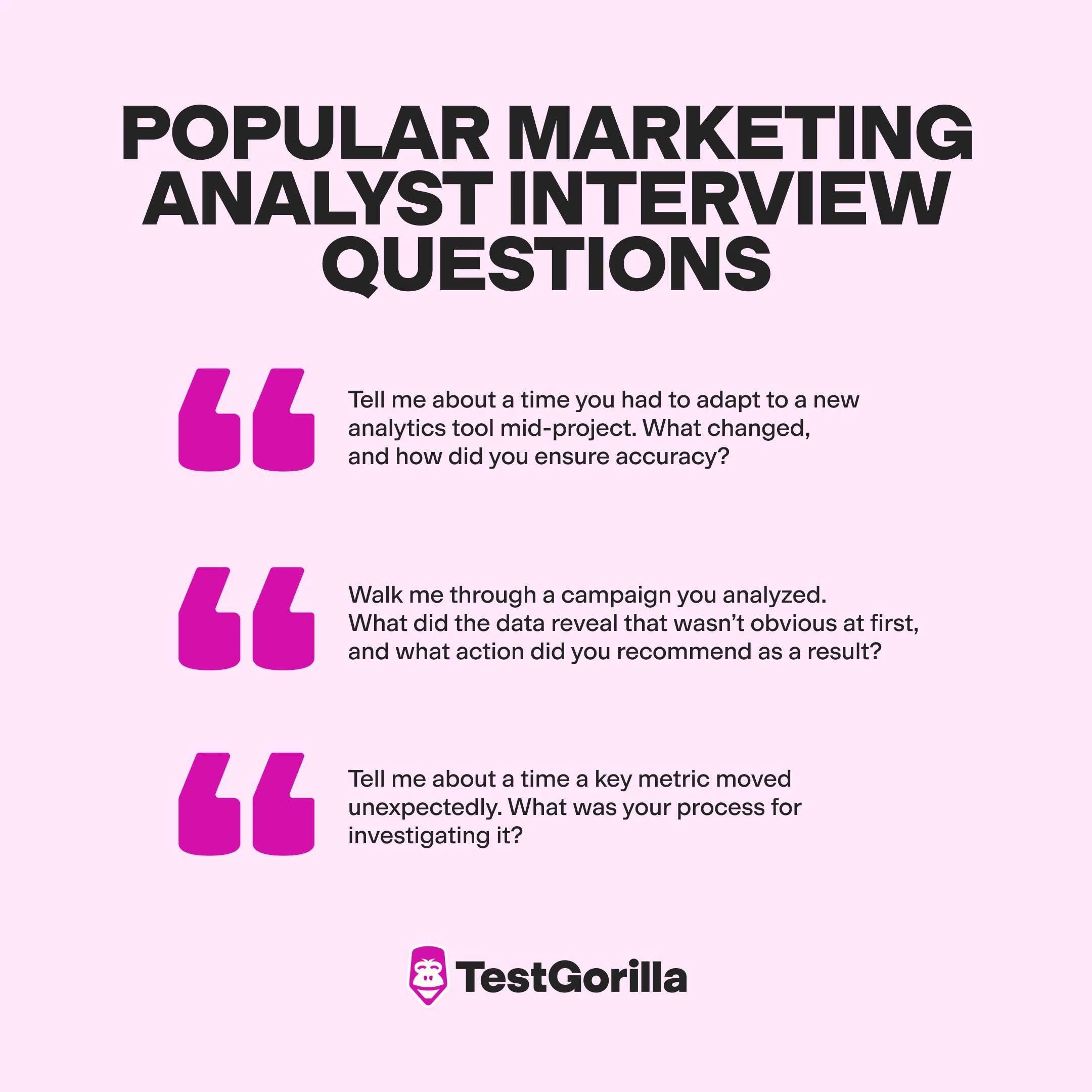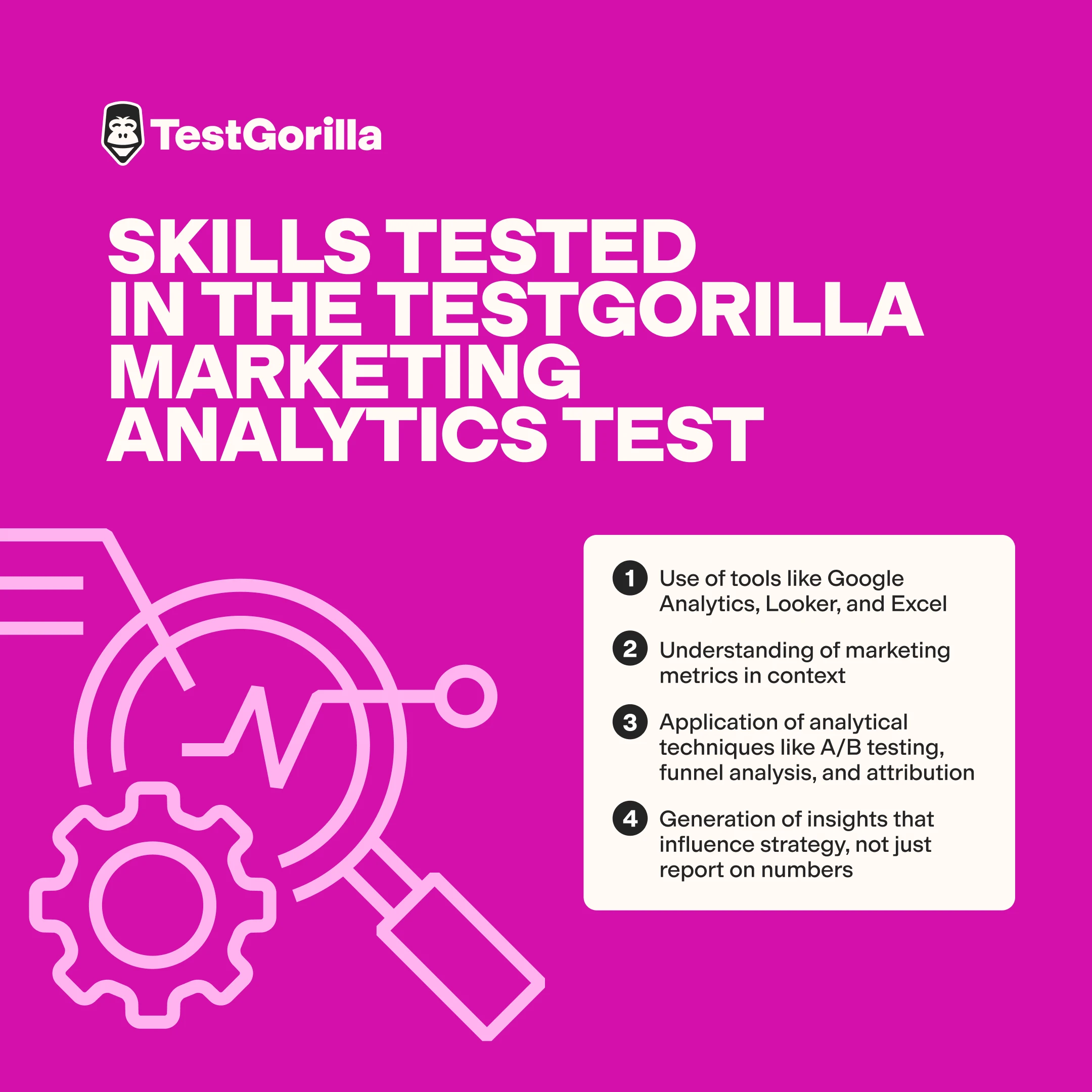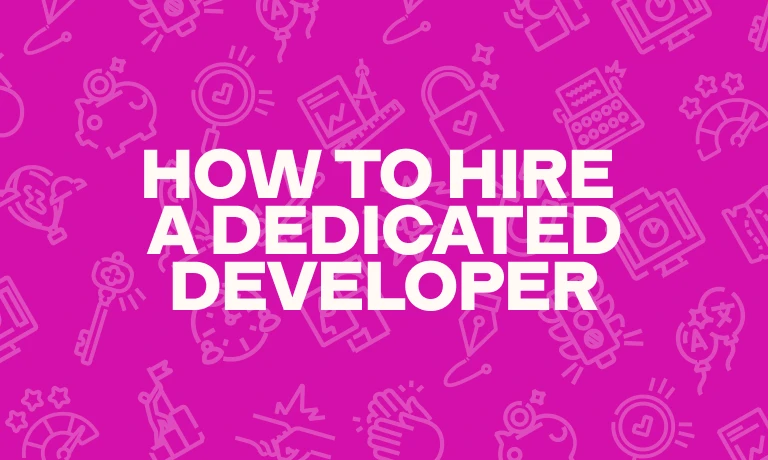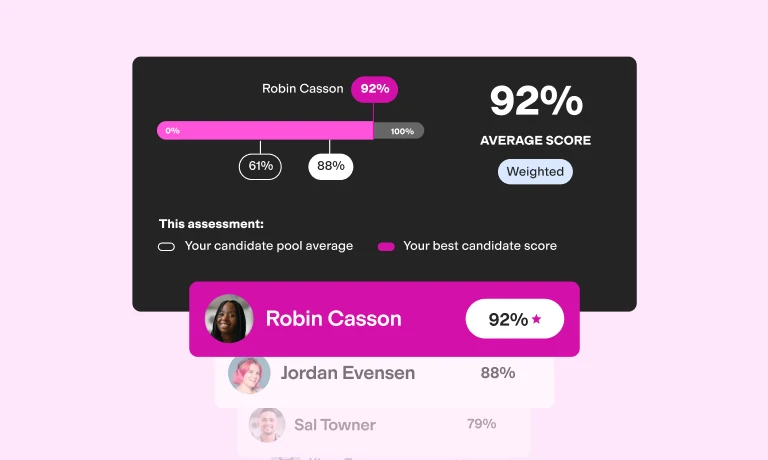Your marketing analyst interview questions are losing you top talent
If your marketing analyst hiring process stops at resumes, portfolios, and “walk me through a campaign” interview questions, you’re not just inefficient – you’re hiring for the wrong signals.
There are better questions to ask and a better process to follow.
Below, we’ll share marketing analyst interview questions that experts ask, along with tips on pairing interviews with talent assessments (like TestGorilla’s Marketing Analytics test) to make stronger hiring decisions.
Why the usual marketing analyst interview questions don’t work
Many interviews revolve around questions that are surface-level and merely reiterate what's already listed in the marketing analyst job description, such as:
“Which marketing platforms have you used?”
“Could you tell me about a campaign you assessed?”
“Which KPIs do you measure?”
These may sound reasonable, even practical. But they fail to reveal anything meaningful about how a candidate actually thinks, solves problems, or adds value to tough decision-making.
Even worse, most interview questions reward marketing analyst candidates who are simply good at sounding qualified without actually being effective. That’s how you end up with analysts who parrot numbers, miss the root cause, and produce reports no one uses.
Marketing analyst interview questions to ask instead
From typical questions to top-notch questions
We’ve found that there are three questions that crop up again and again in marketing analyst interviews, but they’re ineffective. Here’s what to ask instead:
“What marketing tools do you use?” → “Tell me about a time you had to adapt to a new analytics tool mid-project. What changed, and how did you ensure accuracy?”
The new question tests for flexibility, problem-solving, and the ability to stay focused on outcomes – not just features.
“Can you walk me through a campaign you analyzed?” → “Walk me through a campaign you analyzed. What did the data reveal that wasn’t obvious at first, and what action did you recommend as a result?”
The updated question focuses on pattern recognition, insight generation, and the courage to suggest changes to marketing strategies, especially when it’s uncomfortable.
“What metrics do you track?” → “Tell me about a time a key metric moved unexpectedly. What was your process for investigating it?”
With the updated question, you can assess whether the candidate can distinguish between signal and noise, troubleshoot effectively, and think in terms of cause and effect.
What the experts ask – and why it works
We also gathered insights from seasoned marketing leaders on questions they ask to find talented marketing analysts. Here’s what they shared:
Mariana Delgado – Marketing Director, DesignRush
As the Marketing Director at DesignRush, Mariana Delgado brings years of experience guiding strategy across fast-moving digital marketing campaigns. Her hiring instincts are shaped by real business demands – not theory. That’s why her approach to interview questions zeroes in on strategic thinking and applied insight.
“These questions not only examine [candidates’] capacity to think critically, but they also assess their ability to turn information into useful knowledge that helps the business work smoothly.”
One of her favorite questions is, “Can you tell me about a time when your analysis led to a big change in the strategy or direction of a campaign or product?”
We love this question because it forces candidates to move past vanity metrics and talk about outcomes. In interviews, you should always listen for specifics: What decision was influenced? What changed because of it? Weak answers stay stuck in figures, while strong ones show how insight became action.
Another of Delgado’s go-to questions is, “How do you strike the right balance between being creative and using data to make marketing decisions?”
This question is a brilliant way to uncover whether someone sees data as a tool to influence decisions and recommendations or something they hide behind because they lack the creativity required of a marketing analyst.
To add to Delgado’s line of questioning, we’d suggest asking, “Can you give an example of when your creative thinking challenged the data?” That tension between logic and intuition is where great marketers live, and a strong answer to this question can highlight real talent.
Flynn Zaiger – CEO, Online Optimism
Flynn Zaiger is the CEO of Online Optimism and a marketing leader featured by Reuters and Forbes. He’s hired analysts who’ve worked on national marketing campaigns and knows exactly how to separate people who just report data from those who interpret it meaningfully.
One question he recommends is, “Walk me through a time when your data analysis contradicted what everyone expected.”
“This reveals whether they can stand behind their findings and communicate uncomfortable truths,” he explains. “Because let’s face it, sometimes the data shows your CEO’s favorite campaign is actually tanking.”
We’ve seen this situation play out many times. It can be a defining moment when an analyst spots something inconvenient and must choose between remaining silent and speaking up.
During a live interview, Zaiger also runs the following practical scenario:
“I’ll pull up a Looker Studio dashboard (for data visualization) showing a 47% drop in conversions despite increased traffic and ask: ‘What questions would you ask before recommending next steps?’”
“The best candidates,” he says, “immediately ask about seasonality, tracking issues, or platform shifts like iOS updates – instead of rushing to fix what they don’t understand.”
We agree. The question isn’t “What should we do?” It’s “What do we need to understand first?” Smart analysts don’t jump to solutions until they have as much information as possible to inform their ultimate decision. This question tests for structured, patient thinking under pressure.
Finally, Flynn suggests posting a deceptively simple dilemma: “If you had to choose between perfect data from one source or good-enough data from five sources, which would you pick and why?”
“There’s no right answer here, but it shows whether they understand the messy reality of marketing analytics versus the pristine world of academic statistics,” he explains.
This question is gold. It reveals whether a candidate is grounded in real-world complexity or has merely taken a couple of online courses. You should want to hear them wrestle with trade-offs for each option. This answer also uncovers how they operate when data is incomplete (which, let’s be honest, is always).
Carl Rodriguez – Founder & Marketing Head, NX Auto Transport
Carl Rodriguez leads marketing at NX Auto Transport, a company he founded after decades in the automotive industry. He doesn’t deal in hypotheticals; he hires analysts who can perform under pressure in industries where every dollar counts.
He stresses the importance of situational depth with the following questions:
“When the chips were down, and when time was running out, how did you turn the tables?”
“When the budget was running tight, which areas did you identify as needing reckoning first? Why did you give them first priority?”
These questions go beyond textbook knowledge to uncover resilience, prioritization, and business intuition. Those traits are some of the clearest distinctions between analysts who observe and those who act.
Rodriguez also values questions tied to the customer’s voice, such as “Describe a time when you used customer feedback to make changes to marketing plans.”
“At the end of the day, you need to have your customer satisfied,” he explains. “So, is your marketing analyst’s approach also aligned with that reality or not?”
Analysts who never connect with customers, either directly or through feedback, risk optimizing for the wrong signals. When you hear the answer to this question, listen for empathy, iteration, and how insights led to changes in creative or distribution channels, or messaging.
The best insights on HR and recruitment, delivered to your inbox.
Biweekly updates. No spam. Unsubscribe any time.
Why these questions need to come after an assessment, not before
These expert interview questions work best when you’re asking them to candidates who’ve already proven their skills. Without that baseline, you’re just guessing.
That’s why talent evaluation should form a key part of your hiring process.
A structured test, such as TestGorilla’s Marketing Analytics test, gives you confidence that every candidate you interview can:
Use tools like Google Analytics, Looker, and Excel
Understand marketing metrics in context
Apply analytical techniques like A/B testing, funnel analysis, and attribution
Generate insights that influence strategy, not just report on numbers
Once you've confirmed technical ability, you can roll out personality tests and behavioral competency tests to identify candidates who will also thrive in your workplace.
Only then should you move to interviews. At that point, your questions are no longer about evaluating marketing analytics skills. They’re focused on how candidates think, prioritize, and make decisions under pressure.
This is the core of a skills-based hiring process: validate technical and behavioral capabilities up front, then use interviews to assess fit, judgment, and communication style. It’s structured, efficient, and far more predictive than relying on resumes or gut instinct.
And it works. According to TestGorilla’s 2025 State of Skills-Based Hiring Report, 76% of employers now use skills tests, and those who do are nearly twice as likely to be very satisfied with their hires.
Before your next interview, get this right
Experienced recruiters don’t hire marketing analysts just because they know the tools – They hire the analysts who know what to do with them. Too often, weak interviews result in hires who produce reports that appear impressive but lack genuine impact.
That’s where a combination of talent assessments and expert interview questions makes all the difference.
A test like our Marketing Analytics test confirms the essentials: technical fluency, data literacy, and real-world marketing logic. Then, when you’ve shortlisted your top candidates, use the interview to dig deeper – not into buzzwords but into how candidates think, prioritize, and communicate under pressure.
Want to hire marketers who drive results? Try TestGorilla for free or book a demo today.
Related posts
You've scrolled this far
Why not try TestGorilla for free, and see what happens when you put skills first.




















